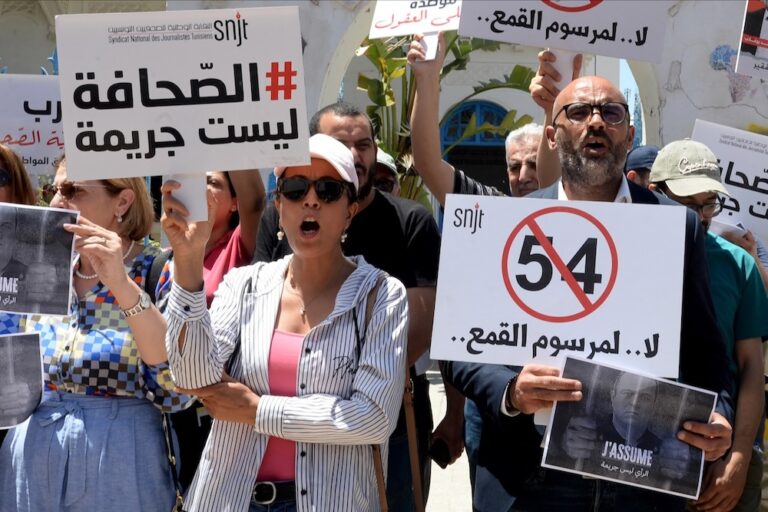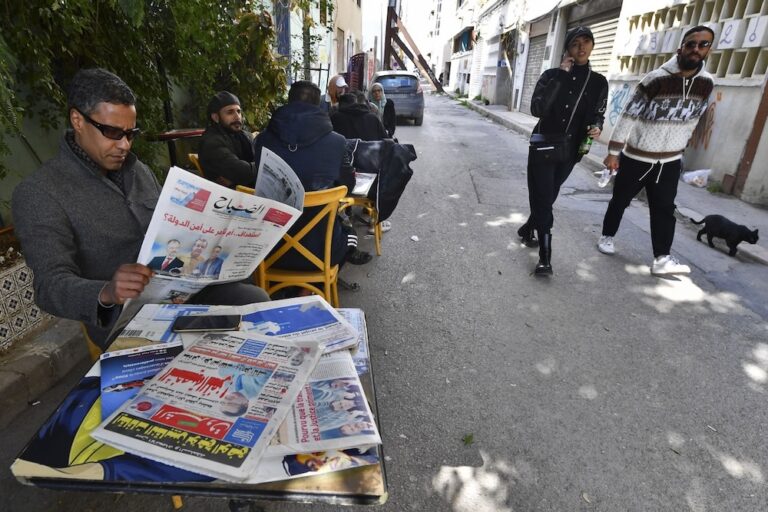(IFEX-TMG) – The following is an IFEX-TMG press release: Tunisia: Freedom of Expression under Siege International freedom of expression organisations today expressed grave concern about the poor state of freedom of expression in Tunisia, host country for the World Summit on the Information Society (WSIS), which is to be held in Tunis in November 2005. […]
(IFEX-TMG) – The following is an IFEX-TMG press release:
Tunisia: Freedom of Expression under Siege
International freedom of expression organisations today expressed grave concern about the poor state of freedom of expression in Tunisia, host country for the World Summit on the Information Society (WSIS), which is to be held in Tunis in November 2005.
A 60-page report on the state of freedom of expression in Tunisia and the conditions for participation in the WSIS has been published today by the International Freedom of Expression Exchange Tunisia Monitoring Group (IFEX-TMG), a group of 13 national, regional and international freedom of expression organisations.
The report, released to coincide with the second Preparatory Committee for the WSIS, in Geneva 17-25 February, sets out the findings of a mission to Tunisia of freedom of expression groups. It makes a series of recommendations to the Tunisian government to bring the country in line with international human rights standards.
The main recommendations of the report are that the Tunisian government should release all prisoners of opinion, end arbitrary administrative detentions, release cyber-dissidents, end harassment and assaults on human rights activists, stop blocking websites, end censorship of books and newspapers, open up the press and broadcasting sector, respect freedom of movement, assembly and association, and allow independent investigation of alleged cases of torture by the security forces.
The full report is available in English and French.
Notes:
1. The International Freedom of Expression Exchange (IFEX) is a global network of 64 national, regional and international freedom of expression organisations.
2. This report is based on a fact-finding mission to Tunisia undertaken from 14 to 19 January 2005 by members of the IFEX-TMG, together with additional background research and Internet testing.
3. The mission was composed of members of the Egyptian Organization for Human Rights, International PEN Writers in Prison Committee, International Publishers Association, Norwegian PEN, World Association of Community Radio Broadcasters (AMARC) and World Press Freedom Committee.
4. Other members of the IFEX-TMG are: ARTICLE 19, Canadian Journalists for Free Expression (CJFE), Centre for Human Rights and Democratic Studies (CEHURDES), Index on Censorship, Journaliste en danger (JED), Media Institute of Southern Africa (MISA) and World Association of Newspapers (WAN).
5. The principle findings of the mission were:
* Imprisonment of individuals related to expression of their opinions or media activities.
* Blocking of websites, including news and information websites, and police surveillance of e-mails and Internet cafes.
* Blocking of the distribution of books and publications.
* Restrictions on freedom of association, including the right of organizations to be legally established and to hold meetings.
* Restrictions on the freedom of movement of human rights defenders and political dissidents together with police surveillance, harassment, intimidation and interception of communications.
* Lack of pluralism in broadcast ownership, with only one private radio and one private TV broadcaster, both believed to be loyal supporters of President Ben Ali.
* Press censorship and lack of diversity of content in newspapers.
* Use of torture by the security services with impunity.


